
Acacia podalyriifolia is a perennial tree which is fast-growing and widely cultivated. It is native to Australia but is also naturalised in Malaysia, Africa, India and South America. Its uses include environmental management and it is also used as an ornamental tree. It is very closely related to Acacia uncifera. It grows to about 5 m in height and about the same in total width. It blooms during winter.

Acacia concurrens, commonly known as curracabah or black wattle, is a shrub native to Queensland in eastern Australia.

Acacia hispidula, known colloquially as little harsh acacia, rough-leaved acacia or rough hairy wattle, is a species of Acacia native to eastern Australia.
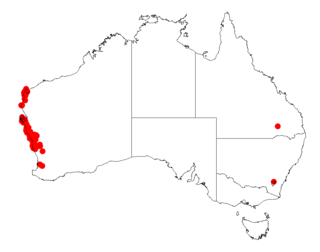
Acacia spathulifolia commonly known as Gold carpet or the Gold carpet wattle is a shrub of the genus Acacia and the subgenus Phyllodineae that is endemic to coastal parts of western Australia.

Acacia sphenophylla is a shrub of the genus Acacia and the subgenus Phyllodineae that is endemic to a small area in western Australia.
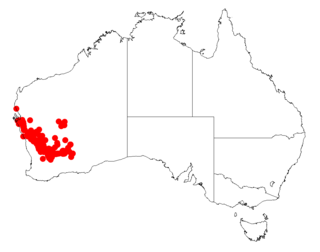
Acacia longispinea is a shrub or tree of the genus Acacia and the subgenus Plurinerves that is endemic to an area of south western Australia.

Acacia pharangites, commonly known as Wongan gully wattle, is a shrub of the genus Acacia and the subgenus Plurinerves that is endemic to a small area of south western Australia and is listed as endangered according to the Environment Protection and Biodiversity Conservation Act 1999.

Acacia calantha is a shrub belonging to the genus Acacia and the subgenus Phyllodineae native to Queensland in Australia.

Acacia johnsonii, commonly known as gereera wattle or geereva wattle, is a shrub belonging to the genus Acacia and the subgenus Phyllodineae that is native to parts of eastern Australia.

Acacia saxicola, commonly known as Mount Maroon wattle, is a shrub belonging to the genus Acacia and the subgenus Phyllodineae native to eastern Australia.

Acacia blakei, commonly known as Blake's wattle or Wollomombi wattle, is a shrub belonging to the genus Acacia and the subgenus Juliflorae that is native to north eastern Australia.

Acacia caroleae, also known as Carol's wattle or narrow leaf currawong, is a shrub belonging to the genus Acacia and the subgenus Juliflorae that is native to north eastern Australia.

Acacia cretata is a shrub or tree belonging to the genus Acacia and the subgenus Juliflorae that is native to north eastern Australia.

Acacia tenuinervis is a shrub or tree belonging to the genus Acacia and the subgenus Juliflorae that is native to north eastern Australia.

Acacia homaloclada, also commonly known as Hitchinbrook wattle, is a shrub of the genus Acacia and the subgenus Plurinerves that is endemic to north eastern Australia. It is listed as vulnerable according to the 1992 Nature Conservation Act.

Acacia johannis is a shrub of the genus Acacia and the subgenus Plurinerves that is endemic to a small area of north eastern Australia.

Acacia legnota, also known as heath wattle, is a shrub of the genus Acacia and the subgenus Plurinerves that is endemic to an area of north eastern Australia.
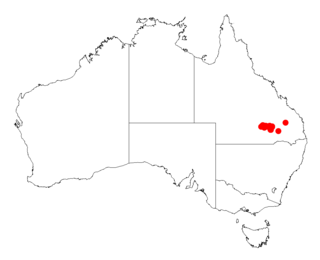
Acacia maranoensis, commonly known as womel, is a shrub of the genus Acacia and the subgenus Plurinerves that is endemic to an area in north eastern Australia.
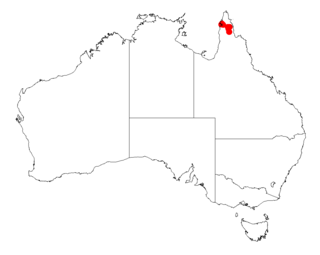
Acacia ommatosperma is a shrub of the genus Acacia and the subgenus Plurinerves that is endemic to an area of north western Australia.
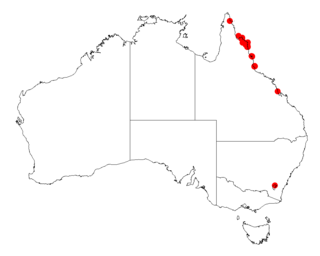
Acacia racospermoides is a shrub or tree of the genus Acacia and the subgenus Plurinerves that is endemic to an area of north western Australia.




















